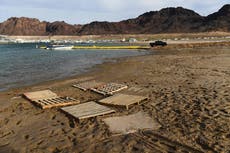Massive rockslide at drought-stricken Lake Powell caught on video
Lake Powell’s water level has dropped precipitously due to a sustained ‘megadrought’ in the US West
Boaters on Lake Powell this past weekend caught on camera a massive rockslide as it collapsed into the water.
The footage shows the sandstone cliff starting to tilt toward the water below, before collapsing and sending a towering spray into the sky and large waves across the lake.
Joseph Cook, from the Arizona Geological Survey, told Arizona’s Family News that the collapse could have been caused in part by the lake’s recent extremely low water levels.
Mr Cook said that the rock cleaving could have been exacerbated by being saturated with water, and then drying out.
Lake Powell was formed when a dam was built on the Colorado River, filling in Glen Canyon along the border of Utah and Arizona. As a result areas of the canyon wall, naturally far above the riverbed, were surrounded by water.
However a two-decade “megadrought” has wreaked havoc across the American West and caused Lake Powell’s water level to drop precipitously, leaving the canyon much emptier than before.
In 1999, Lake Powell held about seven trillion gallons of water. Today, the lake holds about two trillion gallons — and the lake’s surface has dropped by around 160 feet.
The ongoing drought doesn’t just threaten recreational boaters, either. Lake Powell — and nearby Lake Mead, behind the Hoover Dam — are both important drinking water reservoirs for the US Southwest. Both lakes hit record lows this year.
Over 80 percent of the Colorado River basin is currently experiencing “severe drought” conditions, according to the US government’s drought monitor.
Recently, a report named the Colorado the most threatened river in the country, in large part due to drought.
The climate crisis is only expected to worsen droughts in the Southwest. A 2020 study found that the Colorado River’s flow could be reduced by around 9 per cent for every degree Celsius of warming.
Subscribe to Independent Premium to bookmark this article
Want to bookmark your favourite articles and stories to read or reference later? Start your Independent Premium subscription today.





Join our commenting forum
Join thought-provoking conversations, follow other Independent readers and see their replies
Comments